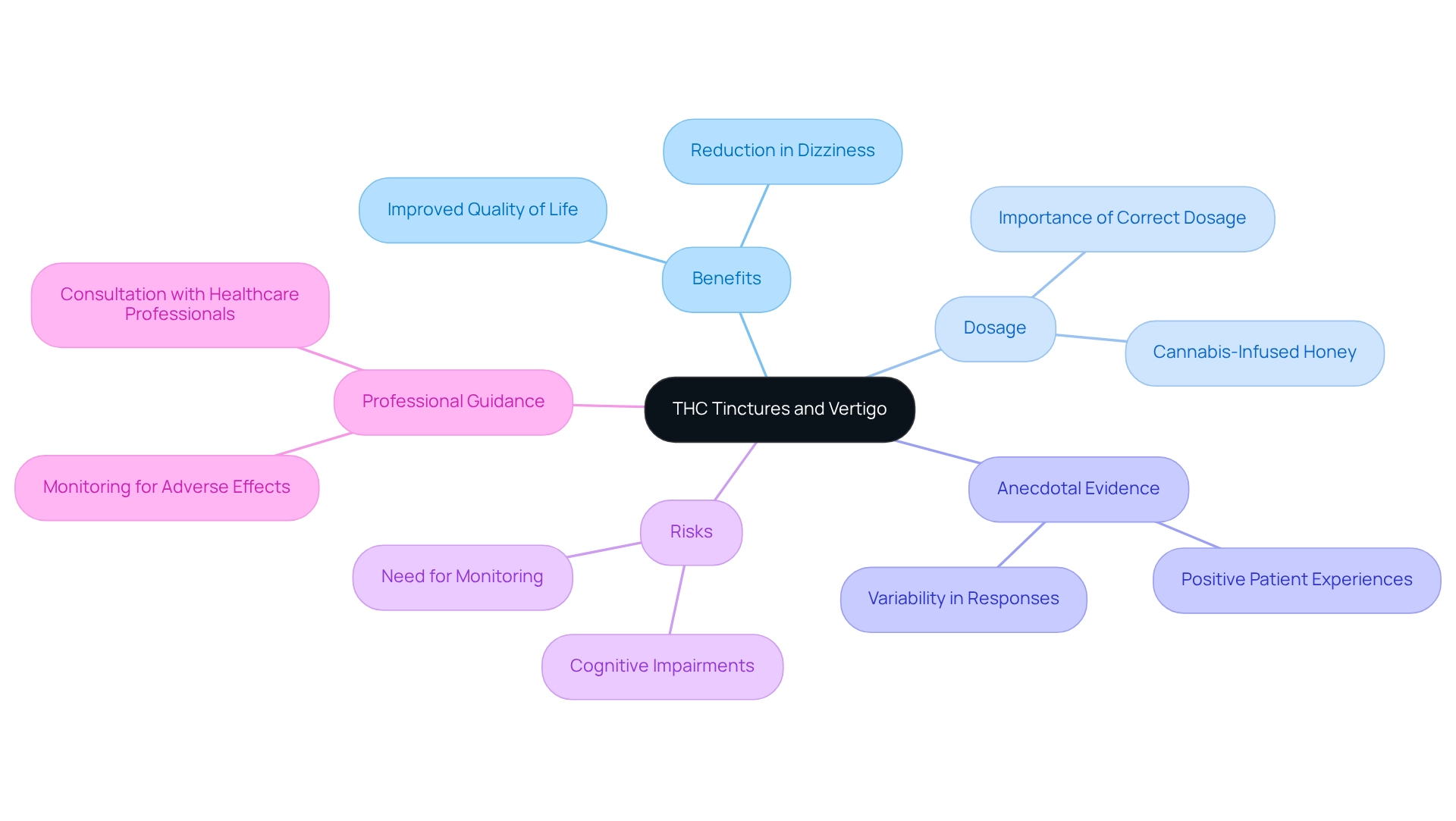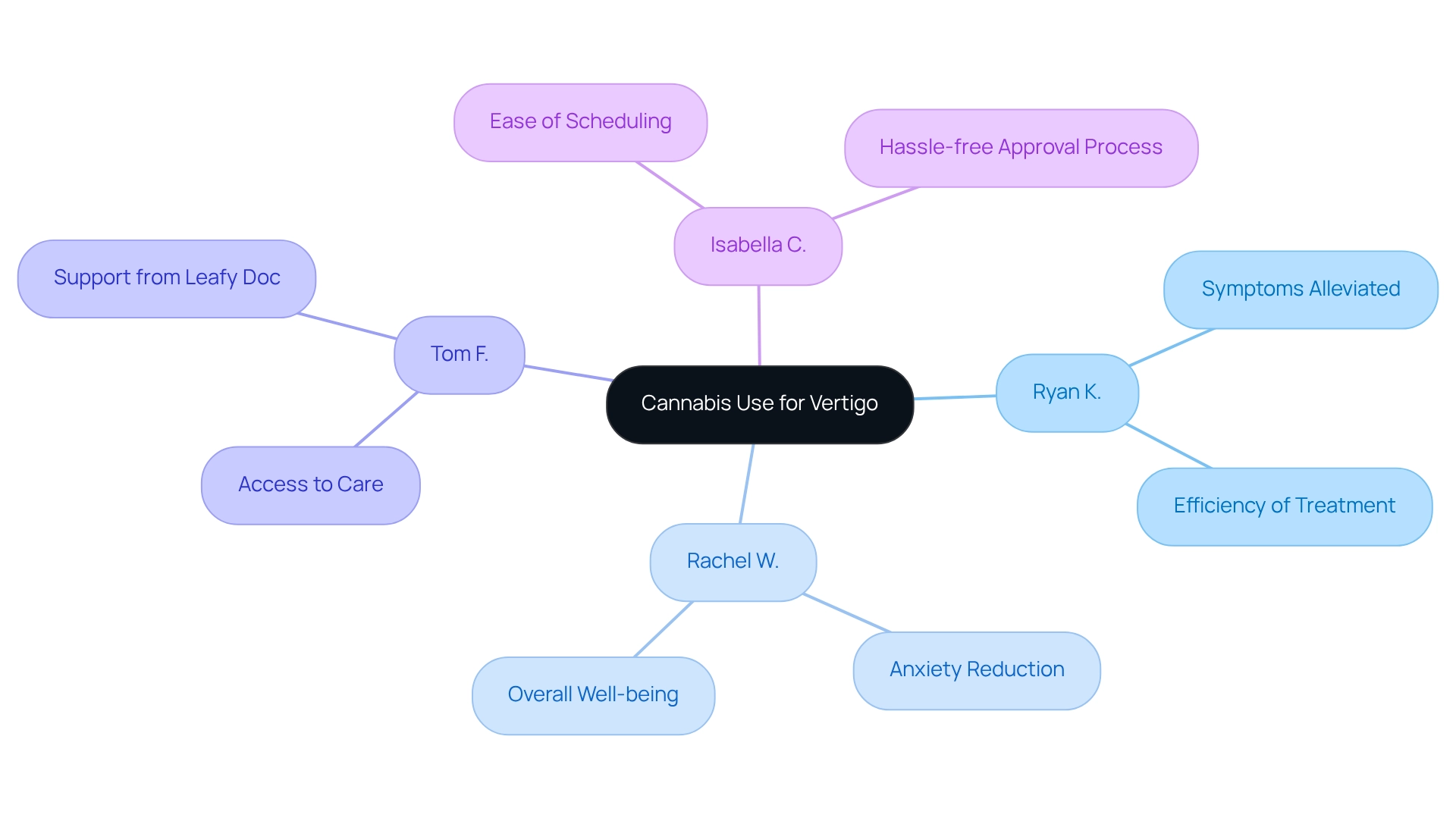What You Need to Know: Does Weed Help with Vertigo?
by Maya Green · April 8, 2025
Discover if weed helps with vertigo symptoms and learn about its potential benefits.

Overview
If you or someone you know has been struggling with vertigo, you might find some comfort in the idea that cannabis could help alleviate those distressing symptoms. Anecdotal evidence and certain studies suggest that THC tinctures may reduce the severity of dizziness and the accompanying nausea for some individuals. Personal accounts from users reveal significant relief from their symptoms, which can be incredibly encouraging.
It’s important to remember that while these experiences are promising, consulting with healthcare professionals is crucial. They can help tailor treatment plans to your specific needs and effectively manage any potential side effects. You deserve to find a solution that works for you, and having the right support can make all the difference.
As you explore this option, consider reaching out to those who have navigated similar challenges. Sharing experiences can foster a sense of community and understanding. Remember, you are not alone in this journey, and there are resources available to help you feel better.
Introduction
In a world where dizziness can disrupt daily life, understanding the multifaceted condition of vertigo is essential. This often misunderstood sensation creates the illusion of movement and is linked to various underlying causes, from inner ear disorders to neurological conditions. It’s important to recognize that approximately 35% of adults experience dizziness at some point. For those affected, acknowledging the symptoms and exploring effective treatments is vital.
Recent developments in medical cannabis have sparked interest among patients seeking alternative solutions to alleviate their discomfort. As research continues to unveil the complexities of vertigo and the potential role of cannabis in managing its symptoms, an exploration of this topic reveals not only the challenges faced by patients but also promising avenues for relief and recovery. You may find that understanding these options can empower you on your journey towards better health.
Understanding Vertigo: Symptoms and Causes
Vertigo is a unique type of unsteadiness that can create the unsettling illusion of motion, either of yourself or your surroundings. This condition can arise from various sources, such as inner ear disorders, vestibular migraines, and neurological conditions. If you’ve experienced a spinning sensation, imbalance, nausea, or difficulty concentrating, you’re not alone. Recognizing these signs is crucial for considering effective treatment options, including whether cannabis might help with vertigo.
In the United States, balance disorders affect a significant portion of the population. Research indicates that around 35% of adults will experience some form of lightheadedness in their lifetime. Among these individuals, conditions like Benign Paroxysmal Positional Vertigo (BPPV) and vestibular neuritis are common, highlighting the need for tailored therapeutic strategies to manage symptoms. Recent studies show that BPPV often manifests as brief episodes of spinning sensations triggered by changes in head position. Fortunately, specific maneuvers can help reposition displaced inner ear crystals, providing relief.
A retrospective analysis involving 907 adults with balance issues revealed that while many cases are benign, a notable number were linked to serious neurological conditions. This finding underscores the importance of accurate diagnosis and appropriate treatment. Common causes of dizziness include inner ear disorders, vestibular migraines, and even orthostatic hypotension, which can cause lightheadedness when standing up.
Experts advocate for a comprehensive approach to treating dizziness. Neurologists often suggest a combination of medications, physical therapy, and, in some cases, surgical interventions, depending on the underlying cause. Francisco Talavera, PharmD, PhD, notes that treatment may involve a personalized mix of medications, surgery, and physical therapy tailored to your specific diagnosis.
For instance, a study on the clinical characteristics of dizziness found that individuals with cochlear symptoms and headaches reported more frequent episodes of dizziness. This suggests a complex relationship between these conditions that warrants further exploration.
As research continues, understanding the intricate nature of dizziness and its symptoms is vital for those seeking relief. Exploring innovative therapies, such as the potential benefits of cannabis for vertigo, could open new avenues for treatment. Medical marijuana has been recognized for its therapeutic properties, particularly in alleviating anxiety, chronic pain, migraines, and PTSD, prompting the question: could it also help with vertigo?
If you’re considering marijuana as a treatment option, you may qualify for a Medical Marijuana Card if you have conditions like anxiety, chronic pain, migraines, or PTSD. Leafy DOC offers a convenient way to obtain this card through telehealth services, allowing you to schedule appointments from the comfort of your home. The process is straightforward, involving the submission of an intake form and consultations with licensed doctors who can assess your condition and recommend medical marijuana.
Moreover, it’s important to note that nine studies have highlighted the economic impact of vestibular dizziness on patients and healthcare systems. Obtaining a Medical Marijuana Card may help alleviate some of these financial burdens, offering a potential pathway to relief.
Remember, you’re not alone in this journey. Understanding your symptoms and exploring your options can empower you to take control of your health and well-being.
Exploring THC Tinctures: Can They Alleviate Vertigo Symptoms?
THC tinctures are concentrated cannabis extracts designed for sublingual administration, allowing for rapid absorption into the bloodstream. Many individuals have turned to these tinctures for their potential to ease symptoms of dizziness, raising the question: does weed help with vertigo? This interest largely stems from their interaction with the endocannabinoid system, which plays a crucial role in regulating balance and spatial orientation. It’s important to understand the dosage of THC tinctures and cannabis-infused honey for safe and effective use, especially if you’re new to these products.
Patients have shared varying experiences, with many noting a reduction in the severity of vertigo episodes and associated nausea. This leads us to ponder: does weed help with vertigo? Anecdotal evidence suggests that THC tinctures can be effective for dizziness, as numerous individuals have reported positive experiences. For example, some have emphasized how these tinctures provided considerable relief during severe episodes, enhancing their overall quality of life. However, it is essential to recognize that individual responses to THC can vary widely, influenced by factors such as dosage, product type, and personal health conditions.
Research indicates that specific characteristics of marijuana use, like age and product type, can be linked to negative emotional experiences, particularly for patients with pre-existing health issues. Given the complexities surrounding marijuana use, especially for those with such conditions, it is crucial for patients to consult healthcare professionals before starting any new treatment regimen. This ensures that you receive personalized guidance and oversight, especially considering the potential for negative effects, such as lightheadedness or cognitive impairments, which can complicate symptom management.
A case study on the negative effects of marijuana in cancer treatment highlights that its use can lead to dizziness and cognitive impairments, emphasizing the importance of careful monitoring. Clinicians are encouraged to closely observe patients using THC tinctures to mitigate any risks associated with cannabis-related toxic effects and drug interactions. One participant noted that they temporarily stopped using THC tinctures while seeking guidance on dosage to optimize its use for their conditions, underscoring the importance of professional guidance.
Additionally, persistent limitations on marijuana research have affected our understanding of its efficacy in addressing various symptoms, including those associated with dizziness. It’s also vital to comprehend the dosage of cannabis-infused honey, as it can complement the effects of THC tinctures, offering a holistic approach to managing symptoms. Remember, you are not alone in this journey, and seeking support can make a significant difference.
Research Insights: The Efficacy of Cannabis in Treating Dizziness
Recent research has delved into whether cannabis can assist with vertigo and alleviate symptoms of lightheadedness. Evidence suggests that cannabinoids, particularly THC, might have an impact on vestibular function, raising the question: can cannabis help with the sensation of lightheadedness? For example, a peer-reviewed study found that patients who used marijuana reported a significant reduction in the intensity of their lightheadedness, reinforcing the inquiry into cannabis’s potential benefits for vertigo.
Moreover, a meta-analysis indicated a weighted mean difference of -0.26 in sleep disturbances among those using marijuana, highlighting its potential benefits beyond just managing dizziness. This is particularly relevant given the rise in self-reported marijuana use in Europe over the past decade, especially among older adults, suggesting a growing acceptance and exploration of cannabis for various health concerns. The transformative effect of medical marijuana is vividly illustrated in personal stories from veterans, cancer patients, and those suffering from chronic pain, all of whom have experienced enhanced quality of life through its use.
A 2025 study, for instance, revealed that veterans using medicinal marijuana reported fewer PTSD symptoms and needed fewer prescription medications, showcasing its effectiveness. Many patients now prefer cannabis over traditional prescription medications due to its efficacy and lower risk of dependency, with studies indicating significant relief from chronic pain and anxiety. Despite these promising findings, it’s essential to recognize that the research landscape is still evolving, and further clinical trials are crucial to establish clear insights into whether cannabis can assist with vertigo.
Additionally, a case study on cannabis treatment for Tourette syndrome showed limited effectiveness, yet it highlights the broader context of cannabinoid efficacy. As the body of evidence continues to grow, it’s vital to approach these findings with cautious optimism regarding cannabis’s potential role in managing vertigo, while acknowledging the necessity for more rigorous studies to fully comprehend the therapeutic possibilities of cannabinoids for vestibular disorders. The endocannabinoid system plays a crucial role in symptom management, as cannabinoids engage with receptors that govern pain, inflammation, and other bodily functions.
Experts note that cannabidiol has demonstrated effectiveness for conditions like epilepsy, further supporting the exploration of cannabinoids for various health challenges. It’s important to remember that if you’re considering cannabis for managing vertigo or related symptoms, discussing this option with your healthcare provider can provide personalized guidance and support.
Potential Risks: Side Effects of THC Tinctures for Vertigo
While THC tinctures may offer relief for some patients experiencing vertigo, it’s important to consider whether weed truly helps with this condition, especially given the range of potential risks and side effects. Commonly mentioned negative effects include:
- Lightheadedness
- Dry mouth
- Altered mental state
- Increased heart rate
Significantly, THC can sometimes exacerbate feelings of lightheadedness or trigger anxiety, particularly in those sensitive to its psychoactive effects.
In a study involving individuals with multiple sclerosis, dronabinol—a synthetic form of THC—showed a significant reduction in central neuropathic pain. However, common side effects like dizziness and drowsiness highlight the need for cautious use. It’s important to remember that while cannabinoids can be effective, they may also carry risks that require careful management.
Statistics reveal that approximately 50% of subjects reported significant improvement in nightmare suppression when using nabilone, another cannabinoid, in contrast to just 11% with a placebo. This suggests that cannabinoids can be beneficial, but they may also disrupt the endocannabinoid system, which plays a vital role in neural development, potentially leading to negative effects.
Therefore, it is essential for individuals to start with a low dose of THC tinctures and closely monitor their reactions. Understanding the potency of cannabis-infused products, like honey, is crucial for safe and effective use, especially for first-time consumers. Consulting with a knowledgeable healthcare provider about marijuana use is highly advisable to mitigate potential adverse effects and ensure safe usage, particularly for those with a history of THC-related anxiety.
Patient experiences can vary greatly, and healthcare providers often recommend a personalized approach to THC use in patients with dizziness. This underscores the necessity for tailored care. As Giovanni Appendino noted, the isolation and provision of specific cannabinoids can be essential for therapeutic applications, emphasizing the importance of expert guidance in this area.
Alternative Treatments for Vertigo: Beyond Cannabis
Many individuals grappling with vertigo symptoms often wonder about the potential benefits of alternative treatments, including cannabis. One effective option is vestibular rehabilitation therapy (VRT), which consists of personalized exercises designed to enhance balance and alleviate dizziness. This therapy has yielded promising results; studies suggest that patients frequently experience significant improvements in their symptoms after engaging in a structured VRT program.
In addition to VRT, medications such as antihistamines and antiemetics are commonly prescribed to help manage dizziness. These treatments can offer quick relief, especially during acute episodes. It’s also vital to recognize the role of lifestyle changes in controlling dizziness. Staying well-hydrated, adjusting dietary habits, and implementing stress management techniques can greatly support those facing this condition.
It’s important to remember that discussing these options with healthcare providers is crucial in identifying the best approach for individual situations. A collaborative strategy involving various healthcare specialists is essential for thorough assessment and management, ensuring that care is tailored to meet unique needs.
As we look at the evolving landscape of dizziness treatment, the global market, valued at $1.3 billion in 2021 and projected to reach $1.9 billion by 2031, highlights the ongoing exploration of alternative therapies. This growth, particularly among the elderly population, underscores the importance of timely access to effective treatments. The COVID-19 pandemic has further complicated treatment accessibility, making it even more vital for individuals to explore all available alternatives, including the potential role of cannabis in managing vertigo.
With Leafy DOC’s efficient process, many requests for medical marijuana cards are processed within 24-48 hours, allowing patients to swiftly access medical cannabis as a viable option for symptom management. As Dr. Benton R. Hunter emphasizes, “The available evidence did not support an association of benzodiazepine use with improvement in any outcomes for acute dizziness,” highlighting the need for alternative therapies that can provide relief without the drawbacks of traditional medications.
The Endocannabinoid System: Its Role in Vertigo Management
The endocannabinoid system (ECS) plays a vital role in helping our bodies maintain balance and stability, particularly when it comes to regulating our sense of spatial orientation. Cannabinoid receptors, which are found throughout various regions of the brain, are essential for vestibular function. It’s important to consider that when THC interacts with these receptors, it may influence how our bodies respond to feelings of lightheadedness and vertigo. This raises a significant question: does cannabis help with vertigo? For many, the potential relief it offers could be life-changing.
This interaction is especially relevant because certain genetic variants within the ECS might affect an individual’s susceptibility to balance disorders. This complexity underscores the importance of the ECS in our overall health. Recent studies have looked into the therapeutic potential of cannabinoids for managing dizziness symptoms. For example, case studies have indicated that CBD can protect endothelial cells, hinting at broader implications for vascular health and balance regulation. This is particularly crucial for individuals dealing with chronic pain, as the state of vascular health can greatly affect overall well-being.
Moreover, experts emphasize the ECS’s role in treating vertigo, leading us to wonder if cannabis can indeed assist in stabilizing our balance through its effects on neurotransmitter release and receptor activity. Individual accounts from users highlight the transformative potential of medicinal marijuana. Veterans coping with PTSD, individuals undergoing chemotherapy, and those suffering from chronic pain have shared stories of improved quality of life thanks to medical marijuana.
Many individuals prefer marijuana over opioids due to its effectiveness in providing relief without the risk of addiction. The ADAGIO Lipids study revealed significant effects of rimonabant on visceral adiposity and liver fat content, offering a broader context for how cannabinoids might influence health beyond just balance issues. As research continues to unveil the intricate relationships between the ECS and equilibrium, many patients are left wondering if cannabis can provide relief for vertigo and its associated symptoms.
Understanding these mechanisms not only sheds light on the potential benefits of marijuana but also highlights the importance of personalized approaches in therapy. As Pál Pacher from the NIH/NIAAA notes, ongoing research is essential for grasping the ECS’s implications for health, particularly concerning managing dizziness. Remember, you are not alone in this journey, and exploring these options could lead to significant improvements in your quality of life.
Navigating Legalities: Medical Cannabis and Vertigo Treatment
Navigating the legal framework surrounding medical marijuana in the United States can feel overwhelming, especially since it varies significantly from state to state. Currently, 24 states, two territories, and the District of Columbia have legalized marijuana for adult recreational use, often including provisions for medical use. If you’re considering marijuana as a remedy for conditions like vertigo, ulcers, kidney stones, or motion sickness, it’s important to understand whether it may help with vertigo and the specific regulations in your state.
To obtain a medical marijuana card, you’ll typically need to consult with a licensed healthcare provider. This evaluation is essential, as it helps determine your eligibility based on your medical history and current condition. Common qualifying conditions for a medical marijuana card include:
- Chronic pain
- Anxiety
- Arthritis
- PTSD
While the process can differ, many individuals find that platforms like Leafy DOC simplify their experience, offering quick approvals and thorough support that stand out from other options. In fact, reports indicate that numerous requests are processed within 24-48 hours, allowing individuals to access vital therapies swiftly.
Understanding the legal aspects of medical marijuana for various health concerns is crucial for ensuring compliance with regulations and safe access to marijuana products. As we look ahead to 2025, the legal status of medical marijuana for conditions such as vertigo prompts the question of whether it truly helps, and discussions about its classification and regulation are continually evolving. Recent developments, such as the Department of Justice’s proposal to reclassify marijuana from Schedule I to Schedule III, could significantly impact how this substance is perceived and utilized in medical contexts, potentially easing access for those seeking treatment.
Many individuals share their experiences, highlighting the importance of understanding these legal frameworks. Numerous people have successfully navigated the complexities of obtaining a medical marijuana card, often sharing their journeys through heartfelt testimonials. For instance, some have mentioned how the process facilitated by Leafy DOC allowed them to receive timely care without the stress of conventional in-person visits.
Legal experts emphasize that being informed about state-specific regulations is vital for anyone considering marijuana as a treatment alternative. By familiarizing yourself with the current legal status and the process involved, you can make informed decisions about your healthcare options. Additionally, while there are concerns that this substance may affect cognitive function, a recent study published in JAMA Psychiatry indicates that any effect is minimal after 72 hours, offering a more nuanced perspective on its use.
It’s also essential to verify which states accept out-of-state medical cards, as this can greatly affect your access to treatment. If you’re ready to take the next step, consider getting your medical card today by connecting with licensed physicians through Leafy DOC for quick and convenient online access.
Anecdotal Evidence: Personal Stories of Cannabis Use for Vertigo
Personal accounts from individuals using marijuana for dizziness reveal a variety of experiences. Many people find significant relief from their symptoms, raising the question: does weed help with vertigo? This relief allows them to resume everyday tasks without the debilitating effects of dizziness. For instance, Ryan K. shared his experience of talking to a doctor and completing the entire process in less than an hour, showcasing the efficiency of Leafy Doc’s service.
In a similar light, individuals like Rachel W. have expressed how marijuana has alleviated their anxiety related to dizziness. This leads us to ponder: does weed help with vertigo? For many, it enhances an overall sense of well-being, even if it doesn’t entirely eliminate the disorientation. Such variations in outcomes underscore the importance of personalized treatment strategies tailored to individual needs. Moreover, research indicates that a substantial percentage of medical marijuana users, approximately 82.4%, regularly take prescribed medications, suggesting that marijuana may serve as a substitute or complementary therapy for those reliant on various prescriptions, particularly for addressing dizziness.
Cannabis presents advantages over prescription drugs, including a lower risk of severe withdrawal symptoms and overdose. This aspect is crucial for patients seeking safer treatment options. This context emphasizes the potential role of marijuana in addressing not only balance issues but also related conditions, prompting the question: does weed help with vertigo?
Personal accounts further illustrate how marijuana can alleviate discomfort associated with dizziness. Patients have shared their journeys, detailing how specific strains or dosages have provided the relief they sought. For example, Tom F. mentioned that living in a rural area made it challenging to access specialist care, but Leafy Doc enabled him to receive expert advice and support from the comfort of his home.
These narratives, while anecdotal, contribute to a growing body of evidence highlighting the need for ongoing monitoring and research into whether weed helps with vertigo, as noted in studies conducted at Israel’s largest marijuana clinic. As discussions surrounding medical cannabis evolve, these individual experiences play a vital role in shaping understanding and guiding future research. Brian Hutton emphasizes the importance of continuous research in this field, reinforcing the necessity for comprehensive studies to validate these findings.
Additionally, with many applications for medical marijuana cards processed within 24-48 hours, patients seeking relief from vertigo symptoms can more easily access treatment. This leads us to consider: does weed help with vertigo? Satisfied users like Isabella C. have praised the ease of scheduling appointments and the hassle-free approval process.
Conclusion
Understanding vertigo and its management is crucial for the countless individuals who experience this disorienting condition. It’s important to recognize the complex nature of vertigo, as it encompasses various symptoms and common causes. Accurate diagnosis and treatment are essential for those affected. As research progresses, the exploration of alternative treatments, particularly medical cannabis, has gained attention due to its potential benefits in alleviating symptoms associated with vertigo.
The role of THC tinctures in managing vertigo symptoms is particularly promising. These tinctures interact with the endocannabinoid system, which regulates balance and spatial orientation. However, it’s vital to remember the necessity for cautious use and professional guidance, as individuals may respond differently to cannabis products. While anecdotal evidence points to significant relief for some, more rigorous clinical trials are essential to establish definitive conclusions regarding the efficacy of cannabis.
Moreover, discussing alternative treatments, such as vestibular rehabilitation therapy and lifestyle modifications, reinforces the idea that a comprehensive approach is vital for effective symptom management. As the medical landscape surrounding vertigo treatment continues to evolve, it’s crucial for patients to remain informed about their options and engage in open conversations with healthcare providers.
In conclusion, the journey toward managing vertigo is multifaceted. Patients should feel empowered to explore various treatment avenues, including the potential benefits of medical cannabis. By understanding the complexities of vertigo and advocating for personalized treatment plans, you can take proactive steps toward improving your quality of life and regaining control over your symptoms.
Frequently Asked Questions
What is vertigo and what causes it?
Vertigo is a type of unsteadiness that creates the illusion of motion, either of yourself or your surroundings. It can arise from various sources, including inner ear disorders, vestibular migraines, and neurological conditions.
What are common symptoms of vertigo?
Common symptoms of vertigo include spinning sensations, imbalance, nausea, and difficulty concentrating.
How prevalent are balance disorders in the population?
In the United States, approximately 35% of adults will experience some form of lightheadedness in their lifetime, indicating a significant prevalence of balance disorders.
What are some specific conditions associated with vertigo?
Common conditions associated with vertigo include Benign Paroxysmal Positional Vertigo (BPPV) and vestibular neuritis.
What treatment options are available for vertigo?
Treatment for vertigo may include medications, physical therapy, and in some cases, surgical interventions, depending on the underlying cause.
How does cannabis potentially help with vertigo?
Cannabis, particularly THC tinctures, may help alleviate symptoms of dizziness and vertigo by interacting with the endocannabinoid system, which regulates balance and spatial orientation.
What is the process for obtaining a Medical Marijuana Card?
To obtain a Medical Marijuana Card, you may need to have qualifying conditions such as anxiety, chronic pain, migraines, or PTSD. The process typically involves submitting an intake form and consulting with licensed doctors through telehealth services.
What are THC tinctures and how are they used?
THC tinctures are concentrated cannabis extracts designed for sublingual administration, allowing for rapid absorption into the bloodstream. They are used by individuals seeking relief from symptoms of dizziness.
Are there any risks associated with using THC tinctures for vertigo?
Yes, individual responses to THC can vary, and there may be risks such as lightheadedness or cognitive impairments. It is essential to consult healthcare professionals before starting any new treatment regimen.
Why is professional guidance important when considering cannabis for vertigo?
Professional guidance is important to ensure personalized care, monitor potential negative effects, and optimize dosage for effective symptom management.
Last Updated: July 11, 2025
Get Approved for Your Medical Marijuana Card in Minutes!

Get Your Medical Card
Connect with a licensed physician online in minutes

Like This Article?
Share with your friends
Table of Contents
Keep Reading
-
5 Ways To Rehydrate Cannabis Buds
Revive your dry cannabis buds with these 5 easy methods! Don’t let dehydration ruin your stash – click now for the best way to rehydrate and bring your buds back to life. Your ultimate rehydration guide awaits, so don’t miss out!
-
Tips For Choosing The Right Medical Marijuana Doctor
Looking for the perfect medical marijuana doctor? Learn expert tips on choosing the right one for you and make an informed decision today. Don’t miss out, click here!
-
How Do I Get a Medical Marijuanas Card in Virginia?
Looking to get a medical marijuana card in Virginia? Here’s everything you need to know, from qualifying conditions to the application process.





